Papers by Marie-José Avenier

The expanding popularity of qualitative research, and more particularly case study research, in t... more The expanding popularity of qualitative research, and more particularly case study research, in the field of Information Systems, Organization and Management research, seems to have been accompanied by an increasing divergence in the forms that this research takes, and by recurrent criticisms concerning its rigor. This paper develops a heuristic framework for guiding the design of a rigorous case study depending on the research’s goal and epistemological framework, as well as for guiding its evaluation. It also highlights the fundamental reasons – namely the epistemological ones – for differences in the guidelines offered in the literature for conducting high quality case studies.
In agreement with numerous authors, we argue for contingent evaluation criteria. We supplement these authors’ works in two ways: (1) we consider various epistemological frameworks that do not appear in the classifications that they use, especially including critical realism and pragmatic constructivism; (2) we propose a set of contingent criteria to be used as a heuristic device for critically and knowledgeably building rigorous case studies within different epistemological traditions.
Keywords: qualitative research, case study, rigor, critical realism, pragmatic constructivism
Article published in Systèmes d'Information et Management 20(1):61-98 • June 2015
DOI: 10.9876/sim.v20i1.632
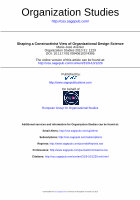
The so-called rigor–relevance gap appears unbridgeable in the classical view of organization scie... more The so-called rigor–relevance gap appears unbridgeable in the classical view of organization science, which is based on the physical sciences’ model. Constructivist scholars have also pointed out a certain inadequacy of this model of science for organization research, but they have not offered an explicit, alternative model of science.
Responding to this lack, this paper brings together the two separate paradigmatic perspectives of constructivist epistemologies and of organizational design science, and shows how they could jointly constitute the ingredients of a constructivism-founded scientific paradigm for organization research. Further, the paper highlights that, in this constructivist view of organizational design science, knowledge can be generated and used in ways that are mutually enriching for academia and practice.
Keywords: constructivist epistemological paradigms, sciences of the artificial, design sciences, interpretive methods, rigor
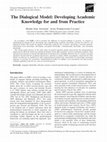
In accordance with EMR’s will to promote the diffusion of research findings to practice, we propo... more In accordance with EMR’s will to promote the diffusion of research findings to practice, we propose a
methodological framework for developing and communicating academic knowledge relevant for practice: the
dialogical model. This model of engaged scholarship comprises five activities: specifying a research question,
elaborating local knowledge, developing conceptual knowledge, communicating knowledge, and activating
knowledge.
The current paper focuses on the early stage of research question design and presents the epistemological
framework in which the model was initially developed. It also offers guidance on how to maintain academic value
and practical relevance in tension throughout the research process. Examples illustrate how to construct research
questions relevant both for academia and practice, and how to justify validity in pragmatic constructivism. This
model can likewise be mobilized in other epistemological frameworks, particularly for knowledge generation purposes. It enriches the researchers’ methodological toolbox by adding a new procedural tool that provides valuable guidelines from the very start of research projects.
Since the development of epistemological thinking in management research, references to construct... more Since the development of epistemological thinking in management research, references to constructivism have multiplied. Among constructivist theorizations which bear on epistemological issues, two constructivist epistemological paradigms have been conceptualized. These paradigms have distinct founding assumptions, raising the question “Are these epistemological paradigms fundamentally or marginally different?”
This article argues that these two constructivist epistemological paradigms are radically different: one has a global scope and subscribes to a pragmatist philosophy, while the other one has a regional scope and lies within post-modernism.
Keywords: epistemology, constructivist epistemological paradigm, radical constructivism, pragmatism, post-modernism
Given the confidential nature of a firm business strategy, one can wonder whether deep field rese... more Given the confidential nature of a firm business strategy, one can wonder whether deep field research is possible in the area of strategic management.
After presenting a typology of the main existing field methods in the social sciences, we discuss the applicability, relevance, potential benefits and potential limits of each type of method in the area of strategic management, given the specificities of the area.
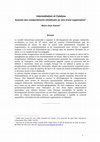
Le modèle hiérarchique pyramidal a supporté le développement des groupes industriels occidentaux ... more Le modèle hiérarchique pyramidal a supporté le développement des groupes industriels occidentaux au cours du 20è siècle, dans un contexte d'industrialisation puis de consommation de masse. Sa mise en œuvre étant généralement synonyme de fragmentation, de compartimentation et de cloisonnement entre services, il apparaît inadapté à la société de l'information qui a émergé dans les dernières décennies de ce siècle, et à la complexité qui l'accompagne.
D'autres modes d'organisation ont été inventés et commencent à se mettre en œuvre tels le management par projets et les fonctionnements en réseau. Mais la mise en acte de modes d'organisation inhabituels suppose une transformation profonde des comportements des acteurs de l'entreprise. Une telle transformation apparaît comme un processus lent et difficile à enclencher. Ainsi par exemple, lorsque l'on est habitué à opérer au sein d'organisations pyramidales très cloisonnées, adopter des comportements coopératifs passe par une remise en cause de manières de faire et de visions du monde profondément ancrées et devenues tacites à force d'habitude.
Le présent chapitre propose une relecture à partir des concepts de signe, de catalyse et d'intermédiation, de la mise en place au sein d'une grande entreprise, Electricité de France, d'un dispositif destiné à susciter le développement de comportements coopératifs entre acteurs de directions opérationnelles différentes (production et transport d'électricité, distribution d'électricité, équipement, formation du personnel, etc.), basés sur un même territoire géographique. De cette expérience vécue en tant qu'intervenant-chercheur dans l'entreprise au sein d'une région administrative particulière, sont inférées diverses voies d'actions susceptibles de faciliter le développement d'actions transversales au sein d'une organisation initialement construite selon un schéma hiérarchique vertical, une problématique à laquelle se trouvent aujourd'hui confrontées de très nombreuses organisations occidentales.
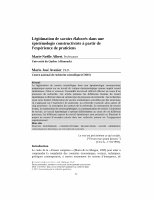
La légitimation de savoirs scientifiques dans une épistémologie constructiviste pragmatique repos... more La légitimation de savoirs scientifiques dans une épistémologie constructiviste pragmatique repose sur un travail de critique épistémologique interne appelé travail épistémique. Celui-ci recouvre l’ensemble du travail réflexif effectué au cours d’un processus de recherche.
Cet article présente les différentes facettes du travail épistémique à effectuer dans un certain type de processus de recherche : les recherches ayant pour finalité l’élaboration de savoirs scientifiques activables par des praticiens, en s’appuyant sur l’expérience de praticiens. La recherche s'articule alors autour de cinq processus : la conception du canevas de la recherche, la construction de savoirs locaux, la construction de savoirs génériques, la communication de savoirs, l’activation de savoirs. Le travail épistémique s’opérant différemment au cours de ces différents processus, les différents aspects du travail épistémique sont présentés en illustrant le propos au moyen d’ exemples puisés dans une recherche portant sur l’engagement organisationnel.
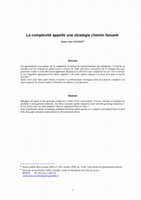
Managers all agree on the growing complexity of their firms' environment. Various concepts of str... more Managers all agree on the growing complexity of their firms' environment. Various concepts of strategy are available in management textbooks. Are these concepts equally adapted to deal with this growing complexity ? If not, which ones are most adapted ? How to implement them in firms ?
After studying the nature of strategic problems that firms which operate in a complex environment have to deal with, this paper proposes some answers to the questions above.
Les gestionnaires s'accordent sur la complexité croissante de l'environnement des entreprises. Lorsqu'ils se tournent vers les manuels de gestion pour y trouver de l'aide, plusieurs conceptions de la stratégie leur sont proposées. Celles-ci sont-elles toutes également adaptées pour affronter cette complexité accrue ? Si ce n'est pas le cas, lesquelles apparaissent les mieux adaptées ? De quels repères dispose-t-on pour leur mise en œuvre concrète ?
Après avoir situé dans quels termes s'exprime la problématique stratégique dans un contexte complexe, cet article apporte un certain nombre d'éléments de réponse à ces questions.
Économies et sociétés, Jan 1, 1989
"Given the confidential nature of a firm business strategy, one can wonder wheth... more "Given the confidential nature of a firm business strategy, one can wonder whether deep field research is possible in the area of strategic management. After presenting a typology of the main existing field methods in the social sciences, we discuss the applicability, relevance, potential benefits and potential limits of each type of method in the area of strategic management, given the specificities of the area."
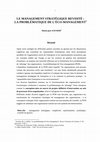
Après avoir souligné les difficultés parfois suscitées en gestion par les dissonances cognitives ... more Après avoir souligné les difficultés parfois suscitées en gestion par les dissonances cognitives que ressentent les responsables d'entreprises entre leurs perceptions sensibles de l'organisation active de l'entreprise et les représentations normatives que les concepts établis par l'usage et par les sciences de gestion leur permettent d'exprimer, on propose une nouvelle réflexion sur la formulation de la problématique du "pilotage" des organisations : la problématique de l'éco-management.
L'hypothèse fondamentale de la problématique de l'éco-management selon laquelle "les organisations sont perçues comme des processus actifs sans frontières", est sans doute inhabituelle puisqu'elle conduit à ignorer une hypothèse implicite à la plupart des travaux dans le domaine du management stratégique de l'entreprise et à en contester la pertinence pratique : la "séparabilité entre l'entreprise et son environnement".
Les diverses hypothèses retenues sur le fonctionnement des organisations socio-économiques conduisent à exprimer la problématique du "pilotage" d'une entreprise comme la conception-mise en œuvre de projets délibérés d'intervention au sein de processus d'éco-organisation, (d'où le néologisme éco-management).
Différents modes d'action suggérés par la problématique de l'éco-management sont discutés, qui, argumente-t-on, transforment les conceptions classiques du management des organisations : à la conception classique d'une organisation-centrée-sur-son-système-de-contrôle, la problématique de l'éco-management suggère de substituer une organisation-centrée-sur-son-système-de-mémorisation.
ABSTRACT Les notions de savoir d'action et de savoir actionnable occupent une place grand... more ABSTRACT Les notions de savoir d'action et de savoir actionnable occupent une place grandissante dans les pratiques de "formation tout au long de la vie" et dans les recherches en sciences de l'éducation et de gestion. Elles font néanmoins l'objet de nombreuses questions, auxquelles ce travail pluridisciplinaire s'efforce de répondre en dépassant le dualisme théorie-pratique.

La stratégie chemin faisant. Paris: Economica, Jan 1, 1997
We introduce a conception of strategy adapted to strategizing in a complex business context, usin... more We introduce a conception of strategy adapted to strategizing in a complex business context, using the term complexity in the sense specified by the French scholar Edgar Morin. We have labelled this conception of strategizing ‘stratégie tâtonnante’, a French phrase that we offer to translate into English as ‘trial-and-error strategizing’. In this chapter we also discuss heuristic markers for practically enacting a ‘stratégie tâtonnante’. Since in this way of doing strategy, the strategy is continually adapted as we go along according to the evolution of the organization’s contexts and goals, we also call it ‘stratégie chemin faisant’. Other translations of these phrases into English have been used such as ‘in itinere strategizing’ and ‘along the way strategizing’. Keywords: strategizing, strategy-as-practice, complexity, stratégie chemin faisant, stratégie tâtonnante, trial-and-error strategizing Dans un univers complexe, la stratégie d'une entreprise doit-elle consister à essayer de suivre au mieux une trajectoire définie une fois pour toutes ou s'adapter en fonction de l'évolution du contexte d'affaires et des buts poursuivis par l'organisation? Ce chapitre propose une manière de pratiquer la stratégie organisationnelle qui est adaptée au faire stratégique dans des contextes complexes. Il offre des repères généraux destinés à éclairer et stimuler la réflexion créative des acteurs. Après une définition de la notion de Stratégie chemin faisant, divers repères pour la mise en acte de cette conception de la Stratégie sont discutés.
La construction des savoirs pour l'action, Jan 1, 2007
Revue française de gestion, Jan 1, 2007
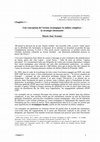
We introduce a conception of strategy adapted to strategizing in a complex business context, usin... more We introduce a conception of strategy adapted to strategizing in a complex business context, using the term complexity in the sense specified by the French scholar Edgar Morin. We have labelled this conception of strategizing ‘stratégie tâtonnante’, a French phrase that we offer to translate into English as ‘trial-and-error strategizing’. In this chapter we also discuss heuristic markers for practically enacting a ‘stratégie tâtonnante’.
Since in this way of doing strategy, the strategy is continually adapted as we go along according to the evolution of the organization’s contexts and goals, we also call it ‘stratégie chemin faisant’. Other translations of these phrases into English have been used such as ‘in itinere strategizing’ and ‘along the way strategizing’.
Keywords: strategizing, strategy-as-practice, complexity, stratégie chemin faisant, stratégie tâtonnante, trial-and-error strategizing
Dans un univers complexe, la stratégie d'une entreprise doit-elle consister à essayer de suivre au mieux une trajectoire définie une fois pour toutes ou s'adapter en fonction de l'évolution du contexte d'affaires et des buts poursuivis par l'organisation?
Ce chapitre propose une manière de pratiquer la stratégie organisationnelle qui est adaptée au faire stratégique dans des contextes complexes. Il offre des repères généraux destinés à éclairer et stimuler la réflexion créative des acteurs.
Après une définition de la notion de Stratégie chemin faisant, divers repères pour la mise en acte de cette conception de la Stratégie sont discutés.
Actes du 3ème colloque de l'AIM, Jan 1, 1997
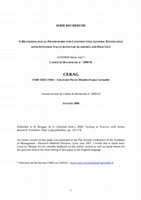
Turning to Practice with Action Research. Frankfurt: …, Jan 1, 2009
This chapter presents a methodological framework for collaborative research projects with practit... more This chapter presents a methodological framework for collaborative research projects with practitioners aimed at developing knowledge from practitioners’ experience, intended to be valuable both for scholars and practitioners.
It begins with an overview of the epistemological paradigm in which this framework has been developed, namely the radical constructivist paradigm. It introduces the notion of epistemic work which plays a core role in the process of knowledge legitimization in this paradigm. It also introduces the notion of generic knowledge which offers ways of overcoming the issue of generalization in this paradigm. The second part provides an overview of the main processes involved in this framework and of the various facets of epistemic work in these processes.
The discussion section offers insights on the context in which this framework was progressively conceptualized over the course of doing collaborative research. It then highlights the differing roles of practitioners and researchers in the various processes involved in the framework. Finally, it identifies where this framework stands in the action research perspective.




Uploads
Papers by Marie-José Avenier
In agreement with numerous authors, we argue for contingent evaluation criteria. We supplement these authors’ works in two ways: (1) we consider various epistemological frameworks that do not appear in the classifications that they use, especially including critical realism and pragmatic constructivism; (2) we propose a set of contingent criteria to be used as a heuristic device for critically and knowledgeably building rigorous case studies within different epistemological traditions.
Keywords: qualitative research, case study, rigor, critical realism, pragmatic constructivism
Article published in Systèmes d'Information et Management 20(1):61-98 • June 2015
DOI: 10.9876/sim.v20i1.632
Responding to this lack, this paper brings together the two separate paradigmatic perspectives of constructivist epistemologies and of organizational design science, and shows how they could jointly constitute the ingredients of a constructivism-founded scientific paradigm for organization research. Further, the paper highlights that, in this constructivist view of organizational design science, knowledge can be generated and used in ways that are mutually enriching for academia and practice.
Keywords: constructivist epistemological paradigms, sciences of the artificial, design sciences, interpretive methods, rigor
methodological framework for developing and communicating academic knowledge relevant for practice: the
dialogical model. This model of engaged scholarship comprises five activities: specifying a research question,
elaborating local knowledge, developing conceptual knowledge, communicating knowledge, and activating
knowledge.
The current paper focuses on the early stage of research question design and presents the epistemological
framework in which the model was initially developed. It also offers guidance on how to maintain academic value
and practical relevance in tension throughout the research process. Examples illustrate how to construct research
questions relevant both for academia and practice, and how to justify validity in pragmatic constructivism. This
model can likewise be mobilized in other epistemological frameworks, particularly for knowledge generation purposes. It enriches the researchers’ methodological toolbox by adding a new procedural tool that provides valuable guidelines from the very start of research projects.
This article argues that these two constructivist epistemological paradigms are radically different: one has a global scope and subscribes to a pragmatist philosophy, while the other one has a regional scope and lies within post-modernism.
Keywords: epistemology, constructivist epistemological paradigm, radical constructivism, pragmatism, post-modernism
After presenting a typology of the main existing field methods in the social sciences, we discuss the applicability, relevance, potential benefits and potential limits of each type of method in the area of strategic management, given the specificities of the area.
D'autres modes d'organisation ont été inventés et commencent à se mettre en œuvre tels le management par projets et les fonctionnements en réseau. Mais la mise en acte de modes d'organisation inhabituels suppose une transformation profonde des comportements des acteurs de l'entreprise. Une telle transformation apparaît comme un processus lent et difficile à enclencher. Ainsi par exemple, lorsque l'on est habitué à opérer au sein d'organisations pyramidales très cloisonnées, adopter des comportements coopératifs passe par une remise en cause de manières de faire et de visions du monde profondément ancrées et devenues tacites à force d'habitude.
Le présent chapitre propose une relecture à partir des concepts de signe, de catalyse et d'intermédiation, de la mise en place au sein d'une grande entreprise, Electricité de France, d'un dispositif destiné à susciter le développement de comportements coopératifs entre acteurs de directions opérationnelles différentes (production et transport d'électricité, distribution d'électricité, équipement, formation du personnel, etc.), basés sur un même territoire géographique. De cette expérience vécue en tant qu'intervenant-chercheur dans l'entreprise au sein d'une région administrative particulière, sont inférées diverses voies d'actions susceptibles de faciliter le développement d'actions transversales au sein d'une organisation initialement construite selon un schéma hiérarchique vertical, une problématique à laquelle se trouvent aujourd'hui confrontées de très nombreuses organisations occidentales.
Cet article présente les différentes facettes du travail épistémique à effectuer dans un certain type de processus de recherche : les recherches ayant pour finalité l’élaboration de savoirs scientifiques activables par des praticiens, en s’appuyant sur l’expérience de praticiens. La recherche s'articule alors autour de cinq processus : la conception du canevas de la recherche, la construction de savoirs locaux, la construction de savoirs génériques, la communication de savoirs, l’activation de savoirs. Le travail épistémique s’opérant différemment au cours de ces différents processus, les différents aspects du travail épistémique sont présentés en illustrant le propos au moyen d’ exemples puisés dans une recherche portant sur l’engagement organisationnel.
After studying the nature of strategic problems that firms which operate in a complex environment have to deal with, this paper proposes some answers to the questions above.
Les gestionnaires s'accordent sur la complexité croissante de l'environnement des entreprises. Lorsqu'ils se tournent vers les manuels de gestion pour y trouver de l'aide, plusieurs conceptions de la stratégie leur sont proposées. Celles-ci sont-elles toutes également adaptées pour affronter cette complexité accrue ? Si ce n'est pas le cas, lesquelles apparaissent les mieux adaptées ? De quels repères dispose-t-on pour leur mise en œuvre concrète ?
Après avoir situé dans quels termes s'exprime la problématique stratégique dans un contexte complexe, cet article apporte un certain nombre d'éléments de réponse à ces questions.
L'hypothèse fondamentale de la problématique de l'éco-management selon laquelle "les organisations sont perçues comme des processus actifs sans frontières", est sans doute inhabituelle puisqu'elle conduit à ignorer une hypothèse implicite à la plupart des travaux dans le domaine du management stratégique de l'entreprise et à en contester la pertinence pratique : la "séparabilité entre l'entreprise et son environnement".
Les diverses hypothèses retenues sur le fonctionnement des organisations socio-économiques conduisent à exprimer la problématique du "pilotage" d'une entreprise comme la conception-mise en œuvre de projets délibérés d'intervention au sein de processus d'éco-organisation, (d'où le néologisme éco-management).
Différents modes d'action suggérés par la problématique de l'éco-management sont discutés, qui, argumente-t-on, transforment les conceptions classiques du management des organisations : à la conception classique d'une organisation-centrée-sur-son-système-de-contrôle, la problématique de l'éco-management suggère de substituer une organisation-centrée-sur-son-système-de-mémorisation.
Since in this way of doing strategy, the strategy is continually adapted as we go along according to the evolution of the organization’s contexts and goals, we also call it ‘stratégie chemin faisant’. Other translations of these phrases into English have been used such as ‘in itinere strategizing’ and ‘along the way strategizing’.
Keywords: strategizing, strategy-as-practice, complexity, stratégie chemin faisant, stratégie tâtonnante, trial-and-error strategizing
Dans un univers complexe, la stratégie d'une entreprise doit-elle consister à essayer de suivre au mieux une trajectoire définie une fois pour toutes ou s'adapter en fonction de l'évolution du contexte d'affaires et des buts poursuivis par l'organisation?
Ce chapitre propose une manière de pratiquer la stratégie organisationnelle qui est adaptée au faire stratégique dans des contextes complexes. Il offre des repères généraux destinés à éclairer et stimuler la réflexion créative des acteurs.
Après une définition de la notion de Stratégie chemin faisant, divers repères pour la mise en acte de cette conception de la Stratégie sont discutés.
It begins with an overview of the epistemological paradigm in which this framework has been developed, namely the radical constructivist paradigm. It introduces the notion of epistemic work which plays a core role in the process of knowledge legitimization in this paradigm. It also introduces the notion of generic knowledge which offers ways of overcoming the issue of generalization in this paradigm. The second part provides an overview of the main processes involved in this framework and of the various facets of epistemic work in these processes.
The discussion section offers insights on the context in which this framework was progressively conceptualized over the course of doing collaborative research. It then highlights the differing roles of practitioners and researchers in the various processes involved in the framework. Finally, it identifies where this framework stands in the action research perspective.
In agreement with numerous authors, we argue for contingent evaluation criteria. We supplement these authors’ works in two ways: (1) we consider various epistemological frameworks that do not appear in the classifications that they use, especially including critical realism and pragmatic constructivism; (2) we propose a set of contingent criteria to be used as a heuristic device for critically and knowledgeably building rigorous case studies within different epistemological traditions.
Keywords: qualitative research, case study, rigor, critical realism, pragmatic constructivism
Article published in Systèmes d'Information et Management 20(1):61-98 • June 2015
DOI: 10.9876/sim.v20i1.632
Responding to this lack, this paper brings together the two separate paradigmatic perspectives of constructivist epistemologies and of organizational design science, and shows how they could jointly constitute the ingredients of a constructivism-founded scientific paradigm for organization research. Further, the paper highlights that, in this constructivist view of organizational design science, knowledge can be generated and used in ways that are mutually enriching for academia and practice.
Keywords: constructivist epistemological paradigms, sciences of the artificial, design sciences, interpretive methods, rigor
methodological framework for developing and communicating academic knowledge relevant for practice: the
dialogical model. This model of engaged scholarship comprises five activities: specifying a research question,
elaborating local knowledge, developing conceptual knowledge, communicating knowledge, and activating
knowledge.
The current paper focuses on the early stage of research question design and presents the epistemological
framework in which the model was initially developed. It also offers guidance on how to maintain academic value
and practical relevance in tension throughout the research process. Examples illustrate how to construct research
questions relevant both for academia and practice, and how to justify validity in pragmatic constructivism. This
model can likewise be mobilized in other epistemological frameworks, particularly for knowledge generation purposes. It enriches the researchers’ methodological toolbox by adding a new procedural tool that provides valuable guidelines from the very start of research projects.
This article argues that these two constructivist epistemological paradigms are radically different: one has a global scope and subscribes to a pragmatist philosophy, while the other one has a regional scope and lies within post-modernism.
Keywords: epistemology, constructivist epistemological paradigm, radical constructivism, pragmatism, post-modernism
After presenting a typology of the main existing field methods in the social sciences, we discuss the applicability, relevance, potential benefits and potential limits of each type of method in the area of strategic management, given the specificities of the area.
D'autres modes d'organisation ont été inventés et commencent à se mettre en œuvre tels le management par projets et les fonctionnements en réseau. Mais la mise en acte de modes d'organisation inhabituels suppose une transformation profonde des comportements des acteurs de l'entreprise. Une telle transformation apparaît comme un processus lent et difficile à enclencher. Ainsi par exemple, lorsque l'on est habitué à opérer au sein d'organisations pyramidales très cloisonnées, adopter des comportements coopératifs passe par une remise en cause de manières de faire et de visions du monde profondément ancrées et devenues tacites à force d'habitude.
Le présent chapitre propose une relecture à partir des concepts de signe, de catalyse et d'intermédiation, de la mise en place au sein d'une grande entreprise, Electricité de France, d'un dispositif destiné à susciter le développement de comportements coopératifs entre acteurs de directions opérationnelles différentes (production et transport d'électricité, distribution d'électricité, équipement, formation du personnel, etc.), basés sur un même territoire géographique. De cette expérience vécue en tant qu'intervenant-chercheur dans l'entreprise au sein d'une région administrative particulière, sont inférées diverses voies d'actions susceptibles de faciliter le développement d'actions transversales au sein d'une organisation initialement construite selon un schéma hiérarchique vertical, une problématique à laquelle se trouvent aujourd'hui confrontées de très nombreuses organisations occidentales.
Cet article présente les différentes facettes du travail épistémique à effectuer dans un certain type de processus de recherche : les recherches ayant pour finalité l’élaboration de savoirs scientifiques activables par des praticiens, en s’appuyant sur l’expérience de praticiens. La recherche s'articule alors autour de cinq processus : la conception du canevas de la recherche, la construction de savoirs locaux, la construction de savoirs génériques, la communication de savoirs, l’activation de savoirs. Le travail épistémique s’opérant différemment au cours de ces différents processus, les différents aspects du travail épistémique sont présentés en illustrant le propos au moyen d’ exemples puisés dans une recherche portant sur l’engagement organisationnel.
After studying the nature of strategic problems that firms which operate in a complex environment have to deal with, this paper proposes some answers to the questions above.
Les gestionnaires s'accordent sur la complexité croissante de l'environnement des entreprises. Lorsqu'ils se tournent vers les manuels de gestion pour y trouver de l'aide, plusieurs conceptions de la stratégie leur sont proposées. Celles-ci sont-elles toutes également adaptées pour affronter cette complexité accrue ? Si ce n'est pas le cas, lesquelles apparaissent les mieux adaptées ? De quels repères dispose-t-on pour leur mise en œuvre concrète ?
Après avoir situé dans quels termes s'exprime la problématique stratégique dans un contexte complexe, cet article apporte un certain nombre d'éléments de réponse à ces questions.
L'hypothèse fondamentale de la problématique de l'éco-management selon laquelle "les organisations sont perçues comme des processus actifs sans frontières", est sans doute inhabituelle puisqu'elle conduit à ignorer une hypothèse implicite à la plupart des travaux dans le domaine du management stratégique de l'entreprise et à en contester la pertinence pratique : la "séparabilité entre l'entreprise et son environnement".
Les diverses hypothèses retenues sur le fonctionnement des organisations socio-économiques conduisent à exprimer la problématique du "pilotage" d'une entreprise comme la conception-mise en œuvre de projets délibérés d'intervention au sein de processus d'éco-organisation, (d'où le néologisme éco-management).
Différents modes d'action suggérés par la problématique de l'éco-management sont discutés, qui, argumente-t-on, transforment les conceptions classiques du management des organisations : à la conception classique d'une organisation-centrée-sur-son-système-de-contrôle, la problématique de l'éco-management suggère de substituer une organisation-centrée-sur-son-système-de-mémorisation.
Since in this way of doing strategy, the strategy is continually adapted as we go along according to the evolution of the organization’s contexts and goals, we also call it ‘stratégie chemin faisant’. Other translations of these phrases into English have been used such as ‘in itinere strategizing’ and ‘along the way strategizing’.
Keywords: strategizing, strategy-as-practice, complexity, stratégie chemin faisant, stratégie tâtonnante, trial-and-error strategizing
Dans un univers complexe, la stratégie d'une entreprise doit-elle consister à essayer de suivre au mieux une trajectoire définie une fois pour toutes ou s'adapter en fonction de l'évolution du contexte d'affaires et des buts poursuivis par l'organisation?
Ce chapitre propose une manière de pratiquer la stratégie organisationnelle qui est adaptée au faire stratégique dans des contextes complexes. Il offre des repères généraux destinés à éclairer et stimuler la réflexion créative des acteurs.
Après une définition de la notion de Stratégie chemin faisant, divers repères pour la mise en acte de cette conception de la Stratégie sont discutés.
It begins with an overview of the epistemological paradigm in which this framework has been developed, namely the radical constructivist paradigm. It introduces the notion of epistemic work which plays a core role in the process of knowledge legitimization in this paradigm. It also introduces the notion of generic knowledge which offers ways of overcoming the issue of generalization in this paradigm. The second part provides an overview of the main processes involved in this framework and of the various facets of epistemic work in these processes.
The discussion section offers insights on the context in which this framework was progressively conceptualized over the course of doing collaborative research. It then highlights the differing roles of practitioners and researchers in the various processes involved in the framework. Finally, it identifies where this framework stands in the action research perspective.